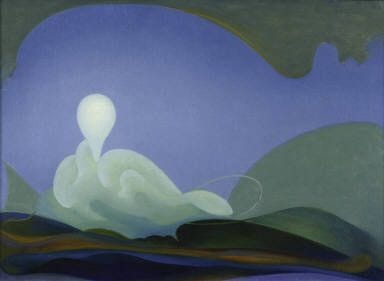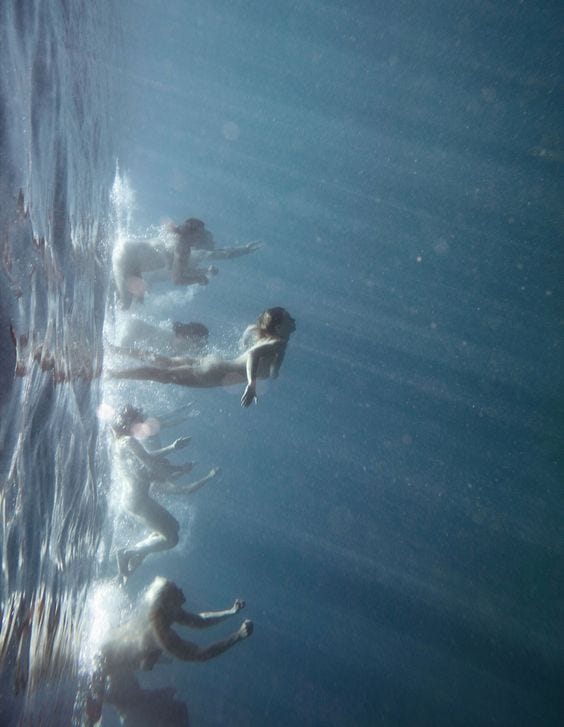The Great Exhale
breathing has become a resilient act in a world overwhelmed by stress, pollution, and disconnection with nature. Looking at whales may teach us more than we might think.
This week, I am taking you to the sea, to see the largest mammal on this earth. Whales have served as a metaphor for human efforts to save the planet, but they now indicate its destruction. We will talk about breath, justice, and how capitalism keeps us from breathing. I am adding a simple yet incredibly important breathing exercise as a ritual, with a tea that helps take care of our lungs. Also, many of you have asked me to also share a reading list, which I am sharing at the end of the essay (for paying subscribers only). Enjoy!
We contain the ocean, even if just a little bit. Blood is made up of sodium, potassium, and calcium, more or less the same as ocean water if you think about it. I love the sea, it is the place where I find solace and calm, there is something about its constant movement that reminds me that life is always happening, as long as we are breathing.
When I went whale watching for the first time, the sea was extremely silent. The waves danced soothingly with each other, and the sun frantically reflected on them, making sparkles. Everyone on the boat was dead silent. And then, all of a sudden, a great exhale broke that silence, and we all gasped.
Whales have appeared in my life on very particular occasions. My uncle Luis, who passed away in April 2020, was the first to introduce me to their power. He was a successful writer and an activist for Greenpeace. He told me about the things he saw when he was on a mission, and he always carried a pendant around his neck with a whale’s tail. “Whales are much more than just whales, they are a metaphor for what the f**k we are doing",” he said. That same year in March, as he was struggling for life in the hospital, I was in Mexico, far away from my family who was in Italy. Lockdowns were beginning, flights were being cancelled, I was totally uncertain of the future and very anxious to get stuck in a country that was not my home, alone. I was near a beach, so I decided to take a walk to look at the sea to calm myself. The second I stepped foot on the black sand of playa Mermejita, in the Oaxaca state, three whales came to greet me. Pfffffff, the magical sound of resilience. You are alive.
I had been unable to breathe properly for three days because a weight of anxiety sat on my chest due to the uncertainty, I felt very alone. What I wasn’t alone in was my inability to breathe; much of the world’s breathing capacity was also being attacked.
At the moment I hadn’t understood the message of those whales, now I think they were trying to remind me to breathe, to understand that I was alive and that was a blessing.
The other day, I was speaking to Brett Davidson, social justice and narrative expert, about the meaning of breath. How it is the first and last thing we do in life, how it is a way to the centre, but how it also carries a political weight. The words “I can’t breathe” cried out by George Floyd as he was being murdered in public, cast a weight on so many of us. They represented the truth of injustice, and they also incited the anger that was needed for so many to take to the streets, and demand rights, and accountability for the racist institutions involved.
Right now, there is a breathing crisis in our world: in the US 1 out of 13 people suffers from asthma, in Italy 4 of the 10 main causes of death are respiratory related. The statistics are more staggering than this, but I wanted to give you an example. I began to think of the collective issues causing this crisis.
The truth is that capitalism leaves many of us breathless, unable to take rest, drowning in debt or running to achieve more. Our lungs have been polluted by our obsession with growth, our life force has lost its significance. By polluting the air, the oceans, we are polluting our own bodies. Breath requires a pause, that between inhale an exhale, that pause is life-giving, breath could not exist without it. A restless world is a breathless world. When we are exhausted, stressed, and poisoned by dirty air, our breathing becomes more difficult. The earth survived millions of years without oxygen, until algaes decided to give us life. At what point did we forget this?
The exhale of whales, who always come up for air despite the dangers humans create for them on the surface, reminded me how resilient of an act breathing has become. Breath as the constant reminder of the present, breath as the constant reminder of life force.
Alexis Pauline Gumbs’ magical book Undrowned: black feminist lessons from water mammals informs that the breathing of whales is as crucial to our own breathing and the carbon cycle as our forests. In fact, the gigantic breathing of whales stores incredible amounts of carbon, and if we returned to pre-commercial whaling numbers, their breath could store the amount of carbon of a forest of 358 sq miles.
Due to both their size and swimming patterns, whales both increase the ocean’s ability to absorb CO2 and at the same time actually act as living carbon sinks that store CO2 in their bodies (the carbon captured by the ocean and coastal organisms is known as “blue carbon”, how poetic.)
These majestic animals have served as a metaphor for human efforts to save the planet, but they now indicate its destruction. An estimated minimum of 300,000 cetaceans are killed a year. Beached whales with stomachs full of plastics are a daily reminder of human destruction. Whale hunting is still practised illegally and if it were not for the efforts of environmentalists in the 80s, whales would probably be extinct by now.
Despite the issues at the surface, whales come up to breathe consistently and resiliently. Acting as a mirror, I cannot help but wonder that perhaps those who still can breathe properly, could learn from whales to fight for, and take care of, our breath more consistently.
Hope you enjoyed reading this. Below I have curated a reading list of non-fiction pieces that I have used in my research. I have also created a little ritual for you to remember the breath which features a lovely tea recipe (specific for lung care), and a breathing excercise.
This work is completely supported by readers, and witnessing the growth of this community is an incredible honour. If you find my writing important, and would like to access more content consider becoming a paid subscriber.
Keep reading with a 7-day free trial
Subscribe to Waves to keep reading this post and get 7 days of free access to the full post archives.




